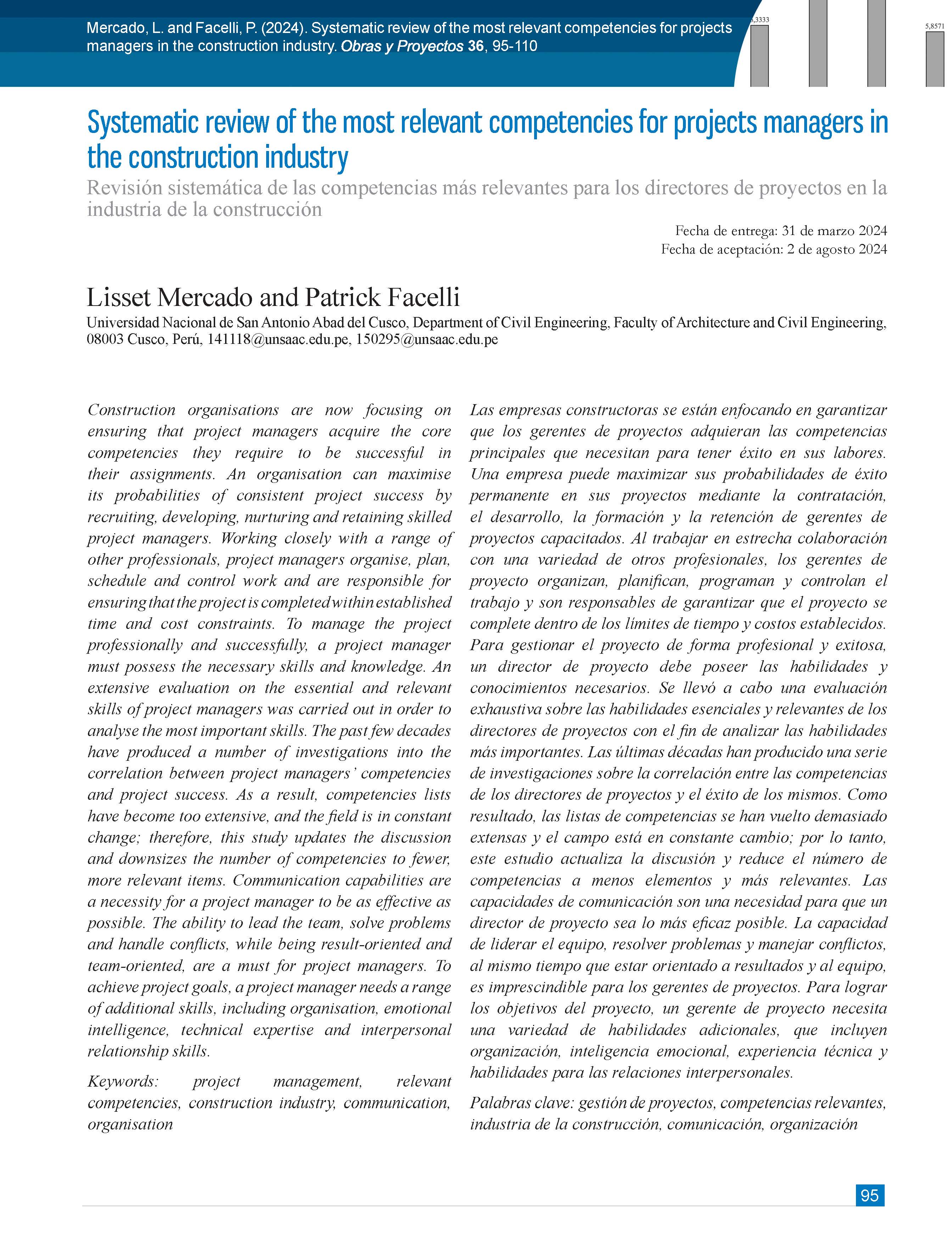Systematic review of the most relevant competencies for projects managers in the construction industry
DOI:
https://doi.org/10.21703/0718-2813.2024.36.3011Keywords:
Project management, Relevant competencies, Construction industry, Communication, OrganisationAbstract
Construction organisations are now focusing onensuring that project managers acquire the core competencies they require to be successful in their assignments. An organisation can maximise its probabilities of consistent project success by recruiting, developing, nurturing and retaining skilled project managers. Working closely with a range of other professionals, project managers organise, plan, schedule and control work and are responsible for ensuring that the project is completed within established time and cost constraints. To manage the project professionally and successfully, a project manager must possess the necessary skills and knowledge. An extensive evaluation on the essential and relevant skills of project managers was carried out in order to analyse the most important skills. The past few decades have produced a number of investigations into the correlation between project managers’ competencies and project success. As a result, competencies lists have become too extensive, and the field is in constant change; therefore, this study updates the discussion and downsizes the number of competencies to fewer, more relevant items. Communication capabilities are a necessity for a project manager to be as effective as possible. The ability to lead the team, solve problems and handle conflicts, while being result-oriented and team-oriented, are a must for project managers. To achieve project goals, a project manager needs a range of additional skills, including organisation, emotional intelligence, technical expertise and interpersonal relationship skills.
References
Aggiag, M.A. (2005). The impact of client attributes on project success: a study of UK public construction projects. Doctoral thesis, University of Northumbria at Newcastle, UK.
Ahadzie, D.K. (2007). A model for predicting the performance of project managers in mass house building projects in Ghana. PhD thesis, University of Wolverhampton, UK.
Ahmadi Eftekhari, N., Mani, S., Bakhshi, J. and Mani, S. (2022). Project manager competencies for dealing with socio-technical complexity: A grounded theory construction. Systems 10(5), 161.
Ahsan, K., Ho, M. and Khan, S. (2013). Recruiting project managers: A comparative analysis of competencies and recruitment signals from job advertisements. Project Management Journal 44(5), 36–54.
Alshammari, F., Yahya, K. and Haron, Z.B. (2020). Project manager’s skills for improving the performance of complex projects in Kuwait construction industry: A review. IOP Conference Series: Materials Science and Engineering 713(1), 012041.
Alvarenga, J.C., Branco, R.R., Guedes, A.L.A., Soares, C.A.P. and Silva, W.S. (2019). The project manager core competencies to project success. International Journal of Managing Projects in Business 13(2), 277–292.
Ballesteros-Sánchez, L., Ortiz-Marcos, I. and RodríguezRivero, R. (2019). The impact of executive coaching on project managers’ personal competencies. Project Management Journal 50(3), 306–321.
Bedingfield, J.D. and Thal, A.E. (2008). Project manager personality as a factor for success. Portland International Conference on Management of Engineering & Technology PICMET, 1303–1314.
Blom, T., Steyn, H. and Bond-Barnard, T.J. (2023). The role of project manager competence in project management success: the case of a utility company. South African Journal of Industrial Engineering 34(1), 143-154.
Ceran, T. and Dorman, A.A. (1995). The complete project manager. Journal of Architectural Engineering 1(2), 67–72.
Chipulu, M., Neoh, J.G., Ojiako, U. and Williams, T. (2013). A multidimensional analysis of project manager competences. IEEE Transactions on Engineering Management 60(3), 506–517.
Crawford, L. (2000). Profiling the competent project manager. Project Management Research at the Turn of the Millennium. Research Conference 2000. Paris, France. Project Management Institute PMI, USA.
Creasy, T. and Anantatmula, V.S. (2013). From every direction – how personality traits and dimensions of project managers can conceptually affect project success. Project Management Journal 44(6), 36–51.
Crisóstomo, A. y Herrera, R.F. (2018). Metodología de toma de decisiones para la selección de subcontratos en la industria de la construcción. Obras y Proyectos 24, 28-40.
Czuchry, A.J. and Yasin, M.M. (2003). Managing the project management process. Industrial Management & Data Systems 103(1), 39–46.
Dulewicz, V. and Higgs, M. (2000). Emotional intelligence – A review and evaluation study. Journal of Managerial Psychology 15(4), 341–372.
Dziekoński, K. (2017). Project managers’ competencies model for construction industry in Poland. Procedia Engineering 182, 174–181.
Edum-Fotwe, F.T. and McCaffer, R. (2000). Developing project management competency: perspectives from the construction industry. International Journal of Project Management 18(2), 111–124.
European Construction Institute (2011). Organisational project management competency frameworks. European Construction Institute. Loughborough, UK.
Ferris, G.R., Treadway, D.C., Perrewé, P.L., Brouer, R.L., Douglas, C. and Lux, S. (2007). Political skill in organizations. Journal of Management 33(3), 290–320.
Fryer, B.G. (2004). The practice of construction management. Wiley-Blackwell, Oxford, UK.
Geoghegan, L. and Dulewicz, V. (2008). Do project managers’ leadership competencies contribute to project success? Project Management Journal 39(4), 58–67.
Ghorbani, A. (2023). A review of successful construction project managers’ competencies and leadership profile. Journal of Rehabilitation in Civil Engineering 11(1), 76–95.
Giraldo, G.E., Pulido, G.H. and Leal, C.A. (2013). Project manager profile characterization in the construction sector in Bogotá, Colombia. Project Management Journal 44(6), 68–93.
Gruden, N. and Stare, A. (2018). The influence of behavioral competencies on project performance. Project Management Journal 49(3), 98–109.
Higgs, M. and Dulewicz, S.V. (2003). The design of a new instrument to assess leadership dimensions and styles. Henley Working Paper Series HWP 0311, University of Reading, UK.
Hwang, B.G. and Ng, W.J. (2013). Project management knowledge and skills for green construction: Overcoming challenges. International Journal of Project Management 31(2), 272–284.
Li, Y., Sun, T., Shou, Y. and Sun, H. (2020). What makes a competent international project manager in emerging and developing countries? Project Management Journal 51(2), 181–198.
Maqbool, R., Sudong, Y., Manzoor, N. and Rashid, Y. (2017). The impact of emotional intelligence, project managers’ competencies, and transformational leadership on project success: An empirical perspective. Project Management Journal 48(3), 58–75.
Montequin, V.R., Nieto, A.G., Ortega, F. and Villanueva, J. (2015). Managerial style profiles of successful project managers: A survey. Procedia Computer Science 64, 55–62.
Moradi, S. (2021). Project managers’ competencies in collaborative construction projects Academic dissertation, Tampere University, Finland.
Moradi, S., Kähkönen, K. and Aaltonen, K. (2020a). Comparison of research and industry views on project managers’ competencies. International Journal of Managing Projects in Business 13(3), 543–572.
Moradi, S., Kähkönen, K. and Aaltonen, K. (2020b). Project managers’ competencies in collaborative construction projects. Buildings 10(3), 50.
Nijhuis, S.A., Vrijhoef, R. and Kessels, J.W.M. (2015). Towards a taxonomy for project management competences. Procedia - Social and Behavioral Sciences 194, 181–191.
Nixon, P., Harrington, M. and Parker, D. (2012). Leadership performance is significant to project success or failure: a critical analysis. International Journal of Productivity and Performance Management 61(2), 204–216.
Podgórska, M., and Pichlak, M. (2019). Analysis of project managers’ leadership competencies: Project success relation: what are the competencies of polish project leaders? International Journal of Managing Projects in Business 12(4), 869–887.
PMI (2021). The standard for project management and a guide to the project management body of knowledge (PMBOK guide). 7th edition. Project Management Institute, Inc. USA.
Russell, J.S., Jaselskis, E.J. and Lawrence, S.P. (1997). Continuous assessment of project performance. Journal of Construction Engineering and Management 123(1), 64–71.
Sang, P., Liu, J., Zhang, L., Zheng, L., Yao, H. and Wang, Y. (2018). Effects of project manager competency on green construction performance: The Chinese context. Sustainability 10(10), 3406.
Sears, S.K., Sears, G.A. and Clough, R.H. (2008). Construction project management: A practical guide to field construction management. 5th ed., Wiley, Hoboken NJ, USA.
Shrivastava, S. (2007). Towards a new taxonomy of managerial competence: an open systems perspective. PhD thesis, Swinburne University of Technology, Melbourne, Australia.
Sunindijo, R.Y. (2015). Project manager skills for improving project performance. International Journal of Business Performance Management 16(1), 67-83.
Sunindijo, R.Y. and Zou, P.X.W. (2011). CHPT construct: essential skills for construction project managers. International Journal of Project Organisation and Management 3(2), 139-163.
Tett, R.P., Guterman, H.A., Bleier, A. and Murphy, P.J. (2000). Development and content validation of a “hyperdimensional” taxonomy of managerial competence. Human Performance 13(3), 205–251.
Toney, F. (2001). The superior project manager. Global competency standards and best practices. CRC Press, Boca Raton, USA.
Trivellas, P. and Drimoussis, C. (2013). Investigating leadership styles, behavioural and managerial competency profiles of successful project managers in Greece. Procedia - Social and Behavioral Sciences 73, 692–700.
Zhang, F., Zuo, J. and Zillante, G. (2013). Identification and evaluation of the key social competencies for Chinese construction project managers. International Journal of Project Management 31(5), 748–759.
Zimmerer, T.W. and Yasin, M.M. (1998). A leadership profile of American project managers. Project Management Journal 29(1), 31–38.

Downloads
Published
Issue
Section
License

This work is licensed under a Creative Commons Attribution-NonCommercial 4.0 International License.







